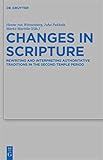Changes in Scripture : rewriting and interpreting authoritative traditions in the second temple period / edited by Hanne von Weissenberg, Juha Pakkala and Marko Marttila.
Material type: TextSeries: Beihefte zur Zeitschrift für die alttestamentliche Wissenschaft ; Bd. 419.Publication details: Berlin : De Gruyter, ©2011.Description: 1 online resource (436 pages)Content type:
TextSeries: Beihefte zur Zeitschrift für die alttestamentliche Wissenschaft ; Bd. 419.Publication details: Berlin : De Gruyter, ©2011.Description: 1 online resource (436 pages)Content type: - 9783110240498
- 3110240491
- 3110240483
- 9783110240481
- 1283165899
- 9781283165891
- 9786613165893
- 6613165891
- Bible. Old Testament -- Criticism, interpretation, etc
- Bible. Old Testament
- Bibel Altes Testament
- Altes Testament
- Deuteronomium
- Qumrantexte
- Transmission of texts
- Transmission de textes
- RELIGION -- Biblical Studies -- Old Testament
- RELIGION -- Judaism -- Sacred Writings
- Transmission of texts
- Textgeschichte
- Frühjudentum
- Literatur
- Religion
- Philosophy & Religion
- Judaism
- Frühjudentum
- Exegese
- Redaktion
- Textgeschichte
- 221.44
- BS1136 .C435 2011
- online - EBSCO
- BC 7820
| Item type | Current library | Call number | URL | Status | Notes | Barcode | |
|---|---|---|---|---|---|---|---|
 eBook
eBook
|
Biblioteca "Angelicum" Pont. Univ. S.Tommaso d'Aquino Nuvola online | online - EBSCO (Browse shelf(Opens below)) | Online access | Not for loan (Accesso limitato) | Accesso per gli utenti autorizzati / Access for authorized users | (ebsco)388197 |
The articles in this volume investigate changes in texts that became to be regarded as holy and unchangeable in Judaism and Christianity. The volume seeks to draw attention to the "empirical" evidence from Qumran, the Septuagint as well as from passages in the Hebrew Scriptures that have been shaped by the use of other texts. The contributions are divided into three main sections: The first section deals with methodological questions concerning textual changes. The second section consists of concrete examples from the Hebrew Bible, Qumran and Septuagint on how the texts were changed, corrected, edited and interpreted. The contributions of the third section will investigate the general influence and impact of Deuteronomistic ideology and phraseology on later texts.
Print version record.
Includes bibliographical references and indexes.
1. Introduction; Introducing Changes in Scripture; 2. Methodological Issues; Changing Scripture; The Evolutionary Production and Transmission of the Scriptural Books; Rewritten Bible, Variant Literary Editions and Original Text(s): Exploring the Implications of a Pluriform Outlook on the Scrip; Talking About Rewritten Texts: Some Reflections on Terminology; 3. Changed Texts; The Pentateuch as Found in the Pre-Samaritan Texts and 4QReworked Pentateuch; David's Three Choices: Textual and Literary Development in 2 Samuel 24.
In English.


